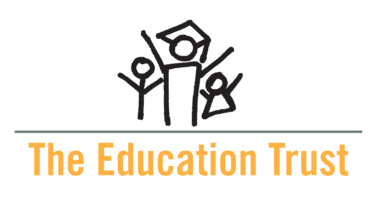On Mission and Movements: John King’s First Day at Ed Trust
For two decades Ed Trust staff and education advocates all over the country have been motivated by a guiding question: What would Kati [Haycock] do? #WWKD. But a few weeks ago, when the board announced that John B. King Jr. would be Kati’s successor, that question quickly shifted … What will John do?
Last week, John started his official tenure as president and CEO, and first on his agenda was answering that question for Ed Trust staff — those of us here in our D.C. office as well as those in our state offices (Ed Trust–West, Ed Trust–Midwest, and, our newest state office, Ed Trust–New York). In talking with staff, John revealed just how all of his previous experiences — as teacher, middle-school principal, state education commissioner, and secretary of education — equip him to build on the organization’s legacy of expanding opportunity for the nation’s most vulnerable students and position it to have even greater reach and influence.
Here’s what we heard and what you can expect:
Mission-Driven
Ed Trust’s mission is at the heart of John’s own experience in education. Great schools and great teachers saved his life. When he was eight, his mother passed away. His father suffered with undiagnosed Alzheimer’s, and life at home was scary and unpredictable. When he was 12, the disease took his father’s life, and he moved around between family members and schools.
That John persisted through those challenging circumstances is a testament to the importance of a quality education and the influence of his New York City public school teachers. Those teachers, John said, made school a place that was safe, stable, nurturing, rigorous, and engaging. But he also knows that he was one of the lucky ones. There are many young people like the child he once was in our public schools today. “No student’s success in life should be left to chance,” John said. Like so many people at Ed Trust and those we work closely with, for John, the mission is personal.
Movement Building
Ed Trust has a long history of creating strong partnerships to advocate for educational equity and excellence. Under John’s leadership, this work will continue, with states and other partners, to use preK-12 policy and practice — including implementation of the new Every Student Succeeds Act — to advance equity and tackle opportunity and achievement gaps that hold back far too many students from reaching their potential.
But we can also expect to ramp up our “movement building,” mobilizing parents and teachers, especially, to elevate their voices and ensure those voices can affect positive change.
More Reason to Be Hopeful
Last week marked the 52nd anniversary of Bloody Sunday, when voting rights activists were beaten by police as they marched across the Edmund Pettis Bridge in Alabama as part of a national movement against segregation. John referenced the historic event for Ed Trust staff as both a source of inspiration and aspiration. “There’s a history of folks committed to social justice persevering,” he said. “And when we think about the challenges they faced, it puts our own into perspective.” And … within reach.
The time is urgent for the work we do. John, Kati, and others who have dedicated their lives to protecting the civil rights of all students have made that clear. Stay tuned to learn more about what John will do and what we all will do together to push our country toward educational justice.








